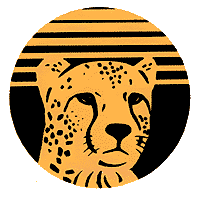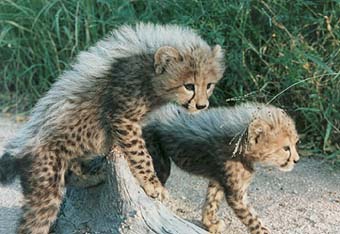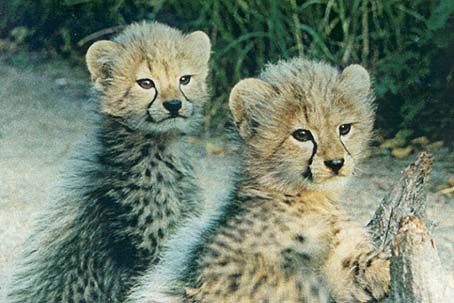|
April 1996 No more baby blues December '95 marked the dawn of a new revived spirit of thankfulness and excitement at the Hoedspruit Research and Breeding Centre for Endangered Species with the birth of seven cheetah cubs. It has been a while since the Centre heard the "tjirping" of cheetah babies following their mothers through the bushes. A few reasons for this 'drought' were suggested, but no real truths were revealed. A Research Committee, chaired by Prof Nick Kriek of the University of Pretoria, commenced with several tests, feeding trails and medical treatments. Their endless efforts paid off: the first litter was born at the begining of December, and only three weeks later a second litter saw the light of Hoedspruit's brightest sun. The births were handled with whispers, as if too sacred to tell the world, but three months later the seven cubs are as healthy and strong as any seven cubs could be.
Birds on a wire The Blue Crane The blue crane Anthropoides paradiseus, South Africa's national bird, is classified as critically endangered. Their numbers have declined over the last few years by 75% - 95%. There are currently thirteen birds at the Hoedspruit Centre, and we are hoping to breed with them. This species' biggest threat is habitat destruction. Its main distribution is in grassland areas. But these same areas are popular for agricultural development by humans. These birds often get killed by poisonous insecticides or by eating poisoned grain left out for problem animals. Futher threats are fences and wires. The blue crane starts breeding at the age of five years and lives up to the age of 20 years. The birds will return to the same nesting place, provided it's undestroyed, usually with the same mate. Both male and female take part in raising the chicks. The Hoedspruit Research and Breeding Centre for Endangered Species is striving to play a significant role in preventing this species from becoming part of the ever-growing list of extinct species. Our hope is that this bird will not only be part of our heritage, but also part of our future. If you would like to obtain further information on the blue crane or other endangered bird species, please phone the Hoedspruit Research and Breeding Centre for Endangered Species at (01528) 31633. The Ground Hornbill The Hoedspruit Research and Breeding Centre for Endangered Species is anxiously awaiting the arrival of six ground hornbills Bucorvus leadbeateri. A specially designed cage is presently under construction. The cage is six metres in height with uniquely built perches and swings. Large trees fill the camp with branches as well as nesting sites to encourage the birds to breed. One nesting place has been placed in a specially designed rondavel, enabling visitors to look into this area through one way glass without disturbing the birds. The cage is surrounded by benches giving visitors the opportunity to quietly sit and observe these unusual birds. A female ground hornbill lays two eggs of which one egg hatches a week before the other. To prevent the second chick, named the Abel-chick, from dying, it is taken out of the nest and raised by human hands. We are hoping to add to the many successes of this project, led by the Pretoria National Zoo. By Vicky Sievewright
Aim The Hoedspruit Research and Breeding Centre for Endangered Species offers an alternative to killing - captivity just might be the only way to freedom. Our aim is to rescue cheetahs from farms where they are seen as a problem and relocate them to safe environments, such as nature reserves and game farms. Please help us to ensure the survival of all species.
The Hoedspruit Research and Breeding Centre
for Endangered Species
|
| If you have no navigation at the top of the page, go HERE. Brought to you by www.wildnetafrica.com © WildNet Africa (Pty.) Ltd. - Africa's Wildest Web Disclaimer: the information on this page is used entirely at the reader's discretion, and is made available on the express condition that no liability, expressed or implied, is accepted by WildNet Africa or any of its associates, employees or subsidiaries for the accuracy, content or use thereof. |

 Cheetah
Chat
Cheetah
Chat
